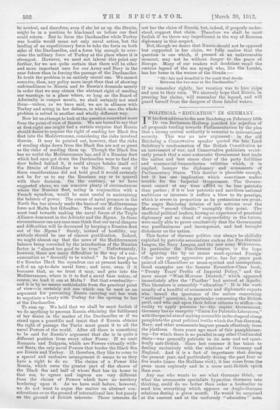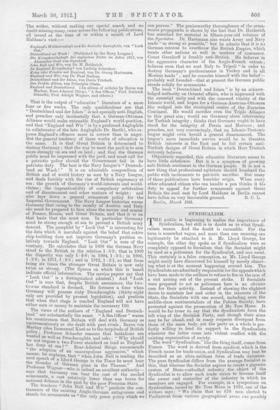POLITICAL " EDUCATION " IN GERMANY.
IN his first address to the new Reichstag on February 16th Dr. von Bethmann-Hollweg justified his rejection of all proposals tending towards Parliamentarians by the plea that a strong central authority is essential to international security. This was no new argument : in the old Reichstag a Conservative speaker quoted the late Lord Salisbury's condemnation of the British Constitution as an instrument of war, and Conservative publicists ersist- entIy preach that a semi-autocratic Government best leads the nation and best steers clear of the party futilities and commercial-humanitarian velleities which, it is implied, hamper the diplomacy and armaments of Parliamentary States. This docrme is plausible enough, but it has one implication which sometimes makes trouble for the Imperial Goyernment. The Govern- ment cannot at any time afraid to be less patriotic than parties ; if it is less patriotic and sacrifices national ambitions or interests it suffers a blow to its prestige, which is severe in proportion as its pretensions are great. The angry Reichstag debates of last autumn over the Morocco "second Ohniitz " exemplify this point. The unofficial political leaders, having no experience of practical diplomacy and no dread of responsibility in the future, were easily able to prove conclusively that the Government was pusillanimous and incompetent, and had brought dishonour on the nation.
This factor of German politics can always 'be skilfully exploited by patriotic associations such as the Pan-German League, the Navy League, and the new army Wehrverein. In particular the Pan-German League, in the hope of spurring the by no means meek-spirited Foreign Office into openly aggressive paths, has for years past painted all Chancellors as mean-spirited and incompetent. Good examples are the famous Reventlow-Class book, "Twenty Years' Profits of Imperial Policy," and the more recent "West-Morocco Deutsch," which appeared immediately after the ' Panther ' had arrived at Agadir. This literature is ostensibly "educative." It is the work usually of a handful of armaments and diplomatic experts who bewail the ignorance of the nation concerning " national " questions, in particular concerning the British peril, and who call upon their fellow citizens to stiffen—in reality to apply pressure to—the supine Government. Germany has an energetic "Union for Patriotic Literature," with the special aim of making accessible in the shape of cheap pamphlets the great political truths which the Pan-German, Navy, and other armaments leagues preach effectively from the platform. Some years ago most of this pamphleteer- mg—for which there is no parallel in any other Continental State—was generally patriotic in ite note and not speci- fically anti-British, Since last summer it has taken to dealing exclusively with the relations of Germany and England. And it is a fact of importance that during the present year, and particularly during the past four or five weeks (since the Haldane visit), it has come from the press more copiously and in a more -anti-British spirit than ever.
Any one who wants to see what Germans think, or what the armaments specialists hypnotize Germans into thinking, could do no better than order a bookseller to send him everything which appears on Anglo-German relations during a given month. He would be surprised at the amount and at the uniformly " educative " note. The writer, without making any special search and no doubt missing many, came across the following publications, all issued at the time of or within a month of Lord Haldane's visit :— England's TVeltherrschaft und die deutsche Luauellotte, von "Look
Out."
Deutschland sei Wach ! (Published by the Navy League.) Die Kriegsbercitschaft der englischen Flotte jut Jahre 1911, von
Alexander Graf von Gersdorff.
John Bull und TVir, von Dr. H. Heiderich.
1st England Kriegslustig ? von Ludwig Schreiner. Krieg oder Frieden mit England, von Dr. Georg Hartmann. England und Wir, von Dr. Paul Nathan.
Deutschland und der lslant, von Davis Trietsch, Das Penfide Albion, von Principiis Obsta. England und Deutschland. (An album of articles by Baron von
Mackay, Roar-Admiral &lege, "A Sea Officer," Prof. Dietrich Schaefer, Prof. Adolph Wagner, and others.)
That is the output of " educative " literature of a mere four or five weeks. The only qualifications are that "Deutschland mid der Islam" is not specially anti-English, and preaches only incidentally that a German-Ottoman Alliance would make untenable England's world-position, and that "England und Wir " is by a professed Anglophile (a collaborator of the late Anglophile Dr. Barth), who ex- poses England's offences more in sorrow than in anger. But the general tendency of these works of education is the same. It is that Great Britain is determined to destroy Germany ; that the way to meet the peril is to arm more strongly on sea and. on land; and that the German public must be impressed with the peril, and must call for a patriotic policy should the Government fail in its patriotic duty. The best is the Navy League's "Deutsch- land eel Wach I" It is an admirable compendium of British and of world history as seen by a Navy League, and deals forcibly with the rise of British supremacy at sea ; the growth of Germany's world-interests and world- claims ; the impracticability of compulsory arbitration and. of disarmament and other matters of reight; and also lays down a general armament policy for the Imperial Government. The Navy League historian warns Germany that owing to the enmity of Austria and Italy she must be prepared to face alone the navies and armies of France, Russia, and Great Britain, and that it is on that basis that she must arm. In particular Germany must be strong enough at sea to prevent a British army descent. The pamphlet by "Look Out" is interesting for the data which it marshals against the belief that active ship-building does not improve Germany's position re- latively towards England. "Look Out" is sure of the contrary. He calculates that in 1898 the German Navy stood to the British in the relation 1 : 6.3 ; that in 1900 the disparity was only 1 : 48; in 1904, 1 : 35; in 1906, 1 : 29; in 1911, 1 : 2.5 ' • and in 1912, 1 : 2.1, so that from being six times the stronger Great Britain is now only twice as strong. (The figures on which this is based indicate official information. The service papers say that "Look Out" is a distinguished admiral.) And "Look Out" is sure that, despite British assurances, the two- to-o no standard is doomed. He foresees a time when Germany will possess sixty Dreadnoughts (thirty-eight only are provided by present legislation), and predicts that when that stage is reached England will not have either men or money to maintain the necessary 120. The views of the authors of "England mid Deutsch- land" are substantially the same. "A Sea Officer" warns his countrymen that Britain will deal with Germany as -unceremoniously as she dealt with past rivals ; Baron von Mackay cites Immanuel Kant as to the turpitude of British policy ; Professor Schaefer reasons that battalions are wanted as well as Dreadnoughts, and asks : "Why should we not impose a two-Power standard on land as England has done at sea P " Rear-Admiral Stiego recommends "the adoption of an unscrupulous aggressive," which means, he explains, that "when John Bull is reading the next speech of a Lloyd George in the Times he must hear the thunder of German guns in the Thames." And Professor Wagner—who is indeed an excellent authority—. says that Germany can bear the cost of the needed armaments, a cost relatively lower than was borne for national defence in the past by the poor Prussian State. The brochure "John Bull und -VVir " predicts the con- tinuance of the existing Anglo-Gorman antagonism and stands for armaments as "the only peace policy which we can pursue." The praiseworthy thoroughness of the arma- ments propaganda is shown by the fact that Dr. Heiderich has searched for material in fifteen-year-old volumes of the Spectator. Dr. Hartmann also wants Army and Navy made "as strong as possible," but he admits that it is no German interest to overthrow the British Empire, which treats other nations so well in matters of commerce. Count Gersdorff is frankly anti-British, Ho believes in the aggressive character of the Anglo-French entente; believes even that we sent Italy to Tripoli "in order to destroy Germany's predominance in Turkey and. in all Moslem lands " ; and he consoles himself with the belief— probably well founded—that at present the German public stands solidly for armaments. The book "Deutschland und Islam" is by an acknow- ledged authority on Oriental affairs, who is impressed with the essential unity and with the renewed vitality of the Islamic world, and hopes for a German-Austrian-Ottoman bloc wedged into the strategical centre of the Eurasian Continent. He would sacrifice even the Triple Alliance to this great aim ; would see Germany alone intervening for Turkish integrity ; thinks that Germany ought to have stood for the integrity of Persia and. Morocco ; and preaches, not very convincingly, that an Islamic-Teutonic league might even herald a general disarmament. The league's more immediate service would. be to threaten British interests in the East and to foil certain anti- Turkish designs of Great Britain in which Herr Trietsch seriously believes. Objectively regarded, this educative literature seems to have little substance. But it is a symptom of growing anti-British sentiment in the German people. It is not a, new thing that professional agitators should bombard. the public with incitements to patriotic sacrifice. But many of these publications have humbler origin. When every other educated citizen who can handle a pen thinks it his duty to appeal for further armaments against Great Britain the seed cast by Lord Haldane in Berlin cannot have fallen on very favourable ground. R. C. L. Berlin, March 18th.







































 Previous page
Previous page